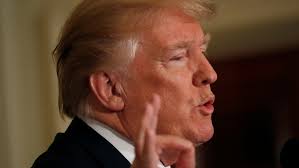
Following the scrutiny of a secret panel about the fall out to national security of the U.S. from ma possible deal between Broadcom Ltd and Qualcomm Inc., U.S. President Donald Trump stopped the hostile takeover of the later by the former via an executive order.
The recommendation for the blocking of the deal was made by the Committee on Foreign Investment in the U.S. This committee examines the fallout of a foreign firm acquiring a U.S company. In what could have been the largest ever technology deal, last ditch efforts were made by top executives of Singapore-based Broadcom to salvage the deal.
"There is credible evidence that leads me to believe that Broadcom Ltd.," by acquiring Qualcomm, "might take action that threatens to impair the national security of the United States," Trump said in the order that was released on Monday in Washington.
The Trump administration has been acting very tough on all attempts of foreign takeovers of U.S. tech companies and is scrutinizing each deal in great details with respect to national security. A Chinese backed investor was not allowed to take over Lattice Semiconductor Corp. in September. That was only the fourth instance in 25 years where a foreign company had been prevented from taking over a U.S. firm on grounds of national security. Because of concerns that had been raised by the CFIUS, there have been at least 6 deals that have not been blocked after Trump assumed office.
Broadcom said that it "strongly disagrees that its proposed acquisition of Qualcomm raises any national security concerns." And was reviewing the order. There was no response to the news from Qualcomm.
The halting of a hostile takeover by the White House this time is being viewed to be unprecedented. There were no agreements between San Diego-based Qualcomm and Broadcom. The later was attempting to gain control of the board of Qualcomm by gaining support of shareholders and then to go ahead with the takeover bid. An investigation to examine the threats to national security was opened by the CFIUS even before an actual deal.
Broadcom was preparing to shift its headquarter from Singapore to the U.S. when the executive order form Trump came. The move by Broadcom was announced way back in November. A meeting of the company top official with Trump then resulted in the approval of the takeover of Brocade Communications Systems by Broadcom being cleared by the CFIUS. The only condition then was that Broadcom moves its headquarters to the U.S.
"In the absence of information that changes CFIUS’s assessment of the national security risks posed by this transaction, CFIUS would consider taking further action, including but not limited to referring the transaction to the president for decision," Treasury said in the letter, which Qualcomm made public earlier Monday.
(Source:www.bloomberg.com)
The recommendation for the blocking of the deal was made by the Committee on Foreign Investment in the U.S. This committee examines the fallout of a foreign firm acquiring a U.S company. In what could have been the largest ever technology deal, last ditch efforts were made by top executives of Singapore-based Broadcom to salvage the deal.
"There is credible evidence that leads me to believe that Broadcom Ltd.," by acquiring Qualcomm, "might take action that threatens to impair the national security of the United States," Trump said in the order that was released on Monday in Washington.
The Trump administration has been acting very tough on all attempts of foreign takeovers of U.S. tech companies and is scrutinizing each deal in great details with respect to national security. A Chinese backed investor was not allowed to take over Lattice Semiconductor Corp. in September. That was only the fourth instance in 25 years where a foreign company had been prevented from taking over a U.S. firm on grounds of national security. Because of concerns that had been raised by the CFIUS, there have been at least 6 deals that have not been blocked after Trump assumed office.
Broadcom said that it "strongly disagrees that its proposed acquisition of Qualcomm raises any national security concerns." And was reviewing the order. There was no response to the news from Qualcomm.
The halting of a hostile takeover by the White House this time is being viewed to be unprecedented. There were no agreements between San Diego-based Qualcomm and Broadcom. The later was attempting to gain control of the board of Qualcomm by gaining support of shareholders and then to go ahead with the takeover bid. An investigation to examine the threats to national security was opened by the CFIUS even before an actual deal.
Broadcom was preparing to shift its headquarter from Singapore to the U.S. when the executive order form Trump came. The move by Broadcom was announced way back in November. A meeting of the company top official with Trump then resulted in the approval of the takeover of Brocade Communications Systems by Broadcom being cleared by the CFIUS. The only condition then was that Broadcom moves its headquarters to the U.S.
"In the absence of information that changes CFIUS’s assessment of the national security risks posed by this transaction, CFIUS would consider taking further action, including but not limited to referring the transaction to the president for decision," Treasury said in the letter, which Qualcomm made public earlier Monday.
(Source:www.bloomberg.com)














